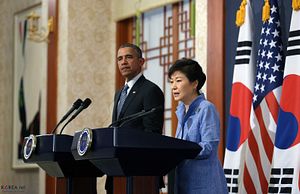South Korean President Park Geun-hye has postponed a planned trip to the United States as the Middle East Respiratory Syndrome (MERS) virus spreads in South Korea. Park originally would have visited the United States from June 14-19, visiting Washington D.C. and Houston, Texas.
Kim Sung-woo, chief presidential press secretary, said that Park had decided to postpone the trip “to take care of public safety, including putting a quick end to MERS.” He added that “the people’s safety is the top priority.”
As of Wednesday, there have been 108 reported cases of MERS in South Korea and nine deaths since the first case was confirmed on May 20. Most of the cases were transmitted within hospitals, many of which initially treated patients without knowing they carried the disease, according to South Korea’s Health and Welfare Ministry. Seoul sees this as a positive, as “there has been no case of an infection in other social settings,” in the words of Deputy Prime Minister Choi Kyung-hwan. “We think we have a chance at putting the outbreak under total control,” Choi added.
Optimism aside, Park’s government has come under fire for its response to the disease. An op-ed in South Korea’s Chosun Ilbo called the government response “passive and several steps too slow,” citing insufficient quarantine procedures for those at risk of infection. Critics also panned the government’s decision to withhold information on which hospitals had treated MERS patients – an especially problematic stance as the MERS outbreak is largely being spread within South Korea’s hospitals. The South Korean government has since publicly released a list of all the hospitals (29 as of Wednesday) affected by the outbreak.
Another major line of criticism was that Park was not taking personal leadership of the outbreak. She did not publicly mention the virus until June 1, nearly two weeks after the first case was confirmed in South Korea. Chosun Ilbo also panned Park’s decision to stick “to her normal schedule…seemingly oblivious to the crisis.” Her U.S. trip was being criticized as well – a Realmeter poll found that 53 percent of respondents believe Park should delay her trip, with 39 percent saying she should continue with the plan.
That makes the move to postpone her U.S. trip a public show of Park’s commitment to ending the outbreak. Yonhap argued that her decision “underscored her new determination to listen to what the people want: public safety.” A spokesman for Park’s Saenuri Party said that Park “considered the psychological impact MERS has had on our society and economy” in postponing the trip. Previously, South Korean officials had considered merely cutting the trip short, by eliminating the planned stop in Houston; Park’s decision to postpone the trip entirely sends an even stronger message about her personal attention to the MERS outbreak.
Still, there’s some concern in South Korea that delaying the Park-Obama meeting could have negative foreign policy ramifications. In particular, Yonhap noted, Seoul wanted Park to have an opportunity to personally explain South Korea’s position on historical issues to the White House prior to Japanese Prime Minister Shinzo Abe’s hotly anticipated August 15 speech commemorating the end of World War II. During his own visit to the Unisted States last April, Abe delivered an address before Congress outlining his take on wartime history.
Other argued that postponing the visit is unlikely to have a lasting effect on the U.S.-South Korea relationship. Daniel Pinkston of the International Crisis Group in Seoul told Yonhap that the Obama administration would be sympathetic to the decision. “The summit would have made a positive contribution to bilateral relations, but everything will be fine,” he said. Obama himself had to cancel a planned trip to Indonesia, Brunei, Malaysia, and the Philippines in October 2013, due to a domestic political battle that shut down the U.S. government.
U.S. National Security Council spokesperson Alistair Baskey said that “President Obama looks forward to welcoming President Park to the White House at a mutually convenient time in the future.” Blue House advisers said Park would reschedule her visit as soon as possible, but cautioned it was too early to begin thinking about alternative dates.































